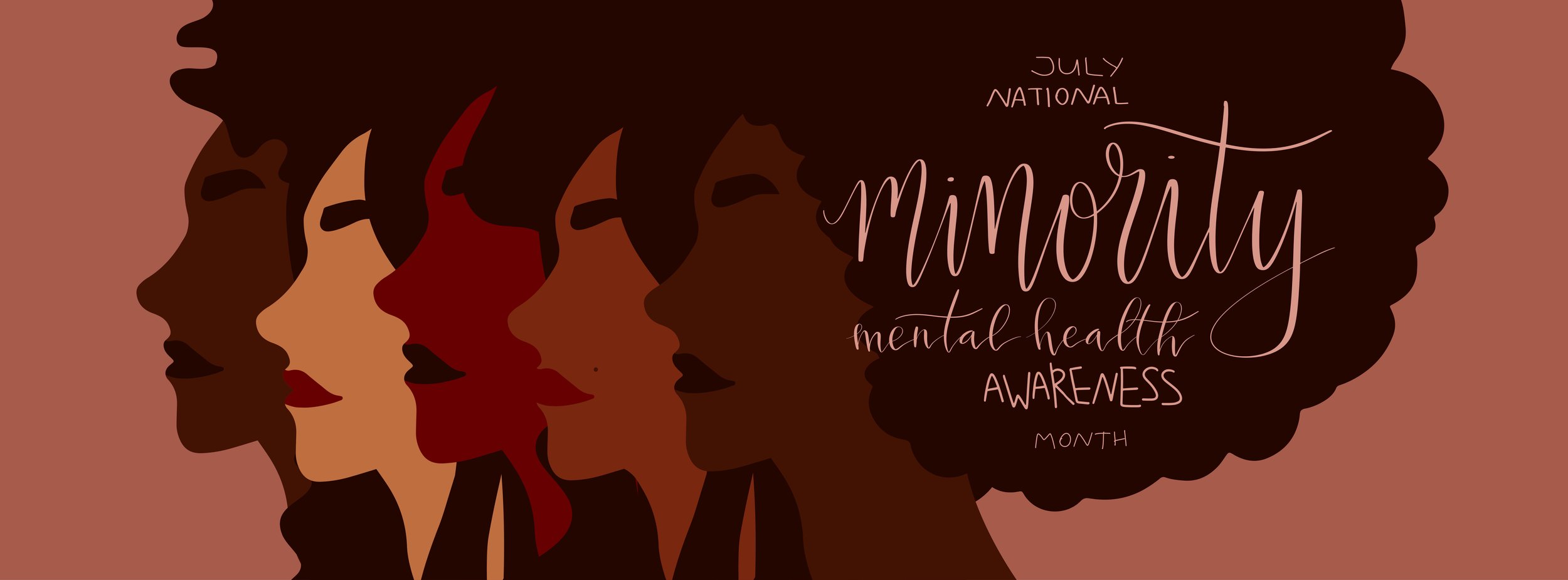Minority Mental Health Month
July is Minority Mental Health Month, a time to recognize the unique struggles and mental health barriers that Black, Indigenous, and People of Color (BIPOC) populations face and to encourage these diverse communities to reach out if they are experiencing psychological distress. As a licensed counselor, mental health is at the center of all the work I do to uplift and empower women in the workplace. Let's dive into what Minority Mental Health Month is, why it matters, and how women of color can take control of their emotional wellness this month and all year long.
What is Minority Mental Health Month and Why Do We Observe It?
Minority Mental Health Month began with an incredible activist named Bebe Moore Campbell. She was a devoted mother who found herself unable to access comprehensive mental health treatment for her bipolar daughter—because in her predominantly Black, low-income neighborhood, such facilities simply didn't exist. She took matters into her own hands by organizing community meetings with other Black moms, and she discovered that the intersection of race, class, and ethnicity caused her community to struggle with silent, untreated mental health issues. She dedicated her life to providing Black and Brown Americans with the education, resources, and support they needed to improve their mental health and lead fulfilling lives.
People of Color and Mental Health
By the Numbers, Mental health doesn't discriminate, but unfortunately, the biomedical establishment still does. Stark inequalities exist between different demographics in terms of access to mental health treatment. According to the American Psychiatric Association, 48% of white Americans diagnosed with a mental illness received help for their condition. In contrast, only 31% of Black Americans, 31% of Hispanic Americans, and 22% of Asian Americans received mental health services.
There are many reasons for these disparities, such as mistrust of the mental health system, lack of resources, and lack of representation in the mental health field. According to CounselingToday.com, about 86% of psychologists are white, and only about 2% are Black, according to CounselingToday.com, meaning many people of color do not have access to a therapist who looks like them or shares their experiences.
These numbers indicate that inequality is alive and well in our national mental health system, and we must all work together to effect positive change and guarantee mental wellness for all.
Some Signs that mental well-being may need attention
Some symptoms of mental illness are well-known and require immediate medical attention. If you experience any of the following, it is important to seek treatment immediately:
Intense, prolonged feelings of sadness
Hearing voices other people don’t hear, or seeing things others don’t see
Panic attacks, or constant feelings of anxiety or dread
Frequent irritability, or becoming irrationally angry over little things
Desire to harm yourself or others
Overly frequent use of drugs or alcohol
However, there are also other less common symptoms that could indicate that your mental health needs attention:
Low self-esteem, or feeling as though you don’t like yourself
Eating too much or too little
Constant exhaustion
Lack of motivation to do things
No longer receiving enjoyment from activities that used to make you happy
Lack of motivation to eat healthy and exercise
A key component of mental health is loving yourself enough to recognize that you deserve to be happy, healthy, and well taken care of. Let’s dive into some ways women of color can uplift and empower themselves and each other to take care of their mental health.
Mental Health for Women of Color
Here are some tips to help you take charge of your wellness:
Try affirmations: Studies have shown that if you repeat the same belief frequently enough, you can rewire your brain to make yourself truly believe it. If you think negative thoughts about yourself—for example, "I’m ugly" or "I’m never going to fit in" or "I’m not good enough to do this job"—stop the thought in its tracks by looking at yourself in the mirror each morning and telling yourself the opposite. Tell yourself—out loud—things like, "I am beautiful, worthy, and powerful. I deserve success in life and I can achieve anything I set my mind to. I am smart, strong, and capable. " Try this every morning for 30 days, and you’ll be amazed by how much your self-esteem can improve.
Challenge the stigma: Remember, mental health issues are no different than any other health problem. You wouldn’t judge yourself for having cancer, so why think of yourself as any less for having depression or mental health diagnoses? Ignore the negative voice in your head that tells you your mental struggles aren’t "real," and see a doctor if you need help.
Reach out: You’d be amazed by how many people will support you when you ask for help. I know that asking is always the hardest part, but true friends will support you when you need them. Contact family and friends to tell them how you’re feeling and tell them you need a little extra love today.
Remember that other people’s opinions aren’t really about you: Feeling judged or disrespected at work (or elsewhere)? Remind yourself that people want others to feel the way that they feel. Confident, happy people empower others and share the love; but negative, unhappy people tear others down so they’re not alone in their suffering. If others are making you feel bad about yourself, it’s because they’re unhappy. Pity them and then don’t waste any energy worrying about what they have to say.
Creating Healthy Habits
Mental health and physical health are inextricably linked. When you take care of your body, your mind will benefit, too. Here are some ways you can take charge of your well-being holistically:
Wear clothes that make you feel beautiful: When we look good, we feel good! I understand that when you’re down in the dumps, you might not feel like putting your favorite dress on, and you might just want to work from home in your PJs with your hair undone. But forcing yourself to stand up, look at your beautiful face in the mirror, and get ready each day can provide the small burst of energy you need.
Eat healthy foods: Fast food and sugary drinks will make your body feel lethargic and sluggish. Opt for healthy snacks like fruits and veggies to give your body the nutrients it needs to provide for you. Remember: part of mental health is loving yourself enough to know that you deserve to feel great inside and out.
Don’t isolate yourself when you feel down: I know it can be hard to go out to dinner with friends when all you want to do is stay home and sleep, but self-isolation is almost guaranteed to make you feel sadder and more alone. Spend time with friends who uplift you when you’re down in the dumps.
One of the most important factors in taking charge of your emotions is to understand them. Write down when you feel sad, angry, or anxious and why. Make note of how your body feels: Do you get aches or pains when you feel sad? Does your heart race when you feel stressed? Examine what you were doing when these feelings struck: were you working on a specific task or recalling a specific event from your past? By identifying your triggers and symptoms, you can learn to predict and moderate your emotions.
Mental Health This Month and Every Month
Inequity can make us feel as though the services, treatments, and institutions we rely on aren’t really "for" us. The truth, however, is that you are entitled to the same access to health and wellness services as anyone else. Take this month as an opportunity to reflect on what you want and need, prioritize yourself, and honor how far you’ve come. Take inventory of your emotions; allow yourself time to unwind when you’re feeling overwhelmed, and remember to reach out if you need help. Believe in yourself—just like I believe in you.

